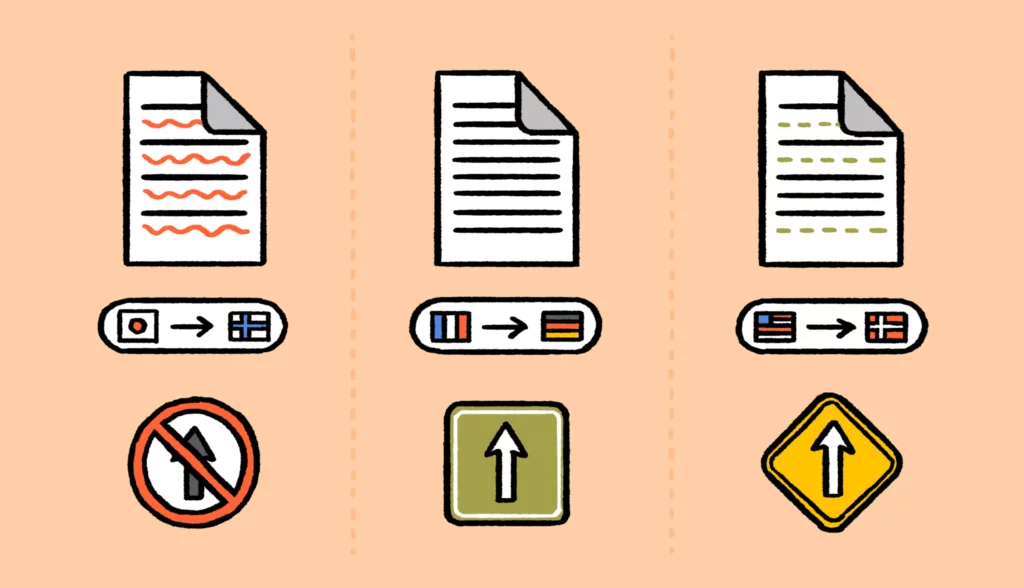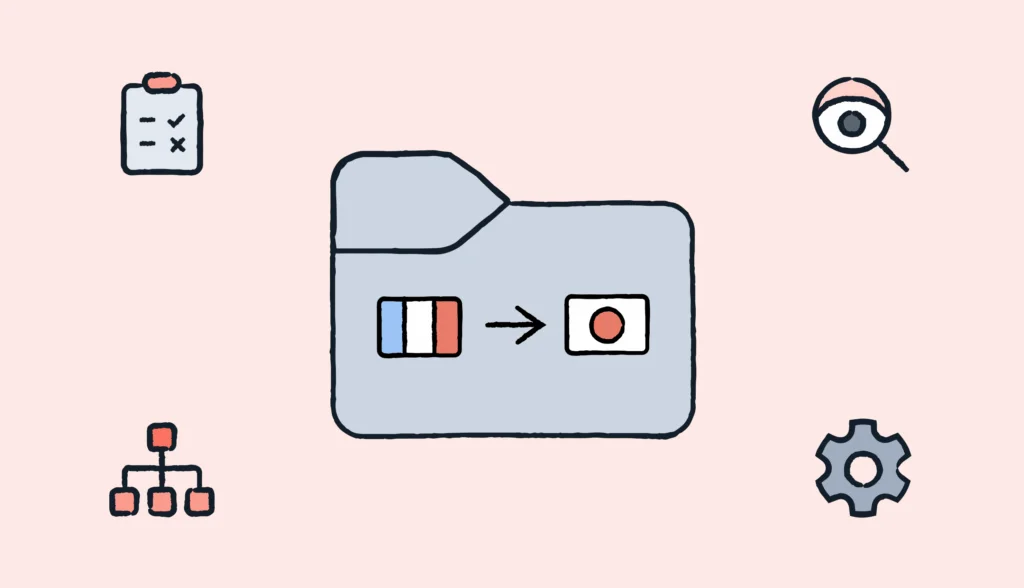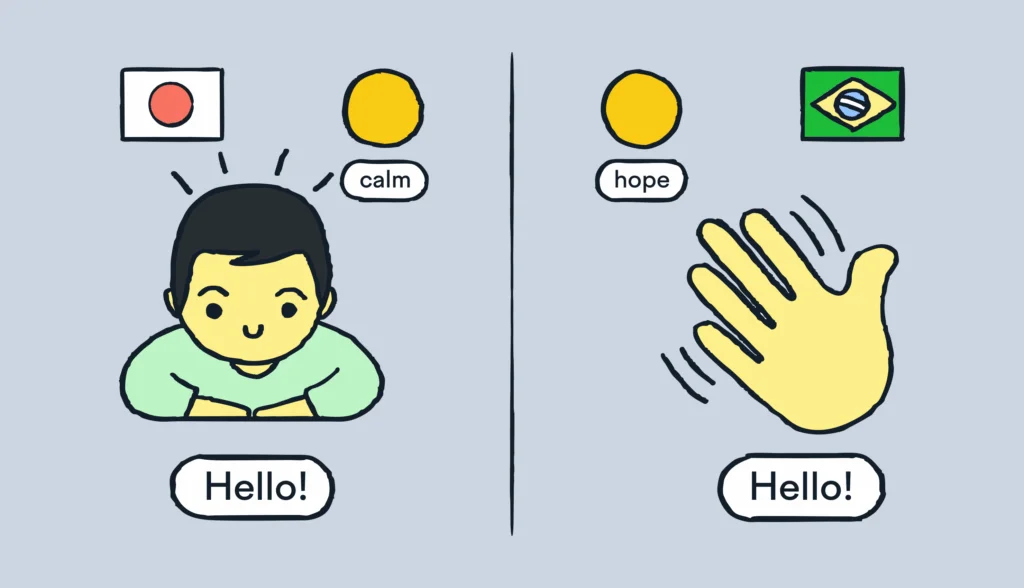Successful localization depends on collaboration with your language partner to deliver the best results for you and your customers. Integrating software internationalization into this process can streamline localization by ensuring your product’s design is adaptable to various languages and cultural norms.
By focusing on a seamless localization process, you can enhance user satisfaction and drive engagement across diverse markets. And while you can find translation companies pretty much anywhere, never underestimate a vendor’s willingness to say yes to a project they won’t be able to carry out.
Truly outstanding translation agencies are hard to come by. And sifting through the sea of vendors, choosing, reviewing, discussing, and onboarding a language partner is time-consuming.
So we put together a list of the most reliable translation companies in the market that offer website translation services, translation of marketing assets, localisation of mobile apps, and more.
12 top translation and localization services companies
1. RWS: best for the life sciences industry
RWS is one of the world’s leading providers of AI-enabled translation, content management, and intellectual property services, including functional and linguistic testing for globalization.
RWS is also considered to be the leading translation company for the life sciences industry.
RWS is the most long-standing translation company on this list with 60+ years of experience.
Number of languages serviced: More than 260
Years operating: 60
Based in: Based in the UK, with ~85 offices globally
Main areas: Translation, patents, life sciences, IT
Notable clients: 90 of the top 100 global brands, the top 10 pharmaceutical companies, and 18 of the top 20 patent filers worldwide
2. TranslateMedia (now TOPPAN Digital): best for transcreation
Global LSP TOPPAN Digital delivers strategy, translation, and marketing services helping retailers and e-commerce businesses expand into new markets.
TranslateMedia translation services are delivering a constantly persuasive tone of voice across diverse cultures, offering services in an impressive number of languages – more than 250.
Number of languages serviced: 250+
Years operating: 17
Based in: The UK with offices in Paris, New York, Hong Kong, and Munich
Main areas: Retail/e-commerce, technology, media, legal & finance
Notable clients: Speedo, Fred Perry, Charles Tyrwhitt, Versace, Lacoste
3. Acclaro: best for Enterprise translation
Acclaro is a translation company that helps leading brands succeed across cultures.
As their partner, you’ll benefit from a strategy-driven localization approach with customized, scalable programs, while using Lokalise to streamline the process.
Working in over 125 languages, they build long-term relationships in the tech, media/entertainment, and apparel/luxury/consumer goods verticals, with clients including Roku, Facebook, Electronic Arts, Coach, and Visa. Let’s accelerate your growth.
Number of languages serviced: 125+
Years operating: 20+
Based in: United States, with employees and production hubs in North and South America, Europe, and Asia
Main areas: Technology & IT, media & entertainment, apparel, luxury goods, consumer goods
Notable clients: Roku, Facebook, VISA, Intel, Uber, Ralph Lauren
4. E2f: best for agile translation
e2f was founded in 2003 as a translation startup and has since grown into a global localization company servicing hundreds of languages.
e2f offers a broad range of services in translation and localization, multimedia, multilingual staffing, and on-device testing. e2f’s clients include high-tech Silicon Valley firms, global game developers, and numerous banking & finance and digital marketing companies.
Using APIs, connectors, or custom integrations, e2f helps their clients move their source content into their translation platforms and return it once it’s been localized. Before handing in the result, the localized websites and apps are rigorously tested.
With expertise in data science, they provide high-quality linguistic datasets of multilingual speech, text, annotation, and quality data required to help machines understand people.
Number of languages serviced: 200+
Years operating: 18
Based in: United States, with 6 offices worldwide
Main areas: HR & e-learning, banking & finance, digital marketing, travel & hospitality, etc.
Notable clients: Odoo, SmartRecruiters, Tripsta, Waze, Trello, Strava
5. Milengo: best for high-quality localization on a budget
Milengo helps their clients by combining advanced, domain-specific language expertise with expert levels of translation, workflow automation, and process optimization.
One of the most experienced translation companies on this list, Milengo is committed to delivering high-level translation and localization services to all-scope businesses, from early-stage startups to international corporations.
The company puts a strong focus on consultancy to help brands succeed in challenging international markets. Currently, Milengo is ranked as the 97th largest LSP in the world and the 21st largest in Europe.
Number of languages serviced: 100+
Years operating: 30+
Based in: Germany, with offices in China, the USA, and Poland
Main areas: IT, hardware, industrial engineering, e-commerce, marketing
Notable clients: Magna, Snowflake, Infor, Celonis
6. Translated: best for reliable and quick translation
Translated boasts a network of 260,000 native translators and copywriters with advanced technological training.
Founded by a linguist and computer scientist, this Italian-based service efficiently combines human creativity and machine intelligence to ensure premium translations.
According to the Nimdzi ranking of the Top 100 largest LSPs, Translated is among the top 10 most productive translation agencies, looking at the average revenue per employee.
The company also takes pride in being one of the best translation companies to work with (as evaluated by translators), which is a significant factor when you’re looking for reliable and quick translation services.
Number of languages serviced: 194
Years operating: 22
Based in: Italy, with 3 offices worldwide
Main areas: 40 different areas, main focus on apps, e-commerce, travel, and software
Notable clients: Airbnb, Google, Uber
7. Language Scientific: best for medical translation
Language Scientific specializes in providing technical, medical, and scientific translation services.
Working at the intersection of science and language, their scientists and doctors-turned-translators and Project Managers understand the complexities of both technical and linguistic challenges.
They provide one of the most effective, rapid, and customer-focused services in the industry.
Language Scientific’s linguists specialize in translating medical documentation, clinical research, and medical device materials.
In addition, they provide translation services in technical fields, such as aerospace, energy, architecture, industrial manufacturing, and many more.
Number of languages serviced: 215+
Years operating: 22
Based in: United States
Main areas: Life sciences and technical fields
Notable clients: 21 of the top 25 pharmaceutical companies, 11 of the top 15 CROs, 16 of the top 20 medical device companies, 8 of the top 15 biotech companies
8. Supertext: best for creative translation
Supertext is a creative copywriting and translation agency offering everything from translating to transcreating and localizing texts in more than 100 languages.
Supertext takes pride in working with “translators who can actually write” and who truly understand marketing.
This will be your go-to agency if you’re looking to transcreate and localize branding campaigns, advertising efforts, websites, videos, and any other digital marketing content.
Number of languages serviced: More than 100
Years operating: 16
Based in: Switzerland, with offices in Berlin and Los Angeles
Main areas: Marketing
Notable clients: LinkedIn, Headspace, Smallpdf
9. Apostroph Group: best for full-service language services
Apostroph Group is an international full-service translation company offering comprehensive, professional language services in Switzerland, Germany, and Austria.
Apostroph Group works with SMEs and international firms as well as NGOs, governing bodies, and authorities.
This experienced translation company employs highly qualified language experts and has a global network of validated freelancers who translate, proofread, edit, and provide copywriting and subtitling translations.
Apostroph Group’s services combine human language intelligence with the latest translation technologies for comprehensive and efficient language management.
Number of languages serviced: 70+ (specialized in German, French, Italian, and English)
Years operating: 27
Based in: Switzerland and Germany
Main areas: Life sciences, ICT, technology & engineering, and financial services
Notable clients: Swisscom, Geberit, Helvetia, MSD, HotellerieSuisse
10. Venga Global: best for building agile localization programs
Translation company Venga has expertise in translation, localization, and creative services in over 150 languages.
Venga is known for building agile localization programs and helping clients grow and mature their global strategy through continuous localization practices that keep pace with rapid development cycles.
Venga takes pride in offering solutions tailored to each client, assigning a team to meet any client demands and challenges. Engagement, transparency, and quality are the company’s main values that help its clients achieve their global ambitions.
Number of languages serviced: 150+
Years operating: 13
Based in: United States, with 9 offices globally
Main areas: Tech startups, SaaS, eLearning, HR, marketing
Notable clients: Slack, Looker, Indeed, Pinterest, Workday
11. Inlingo: best for gaming localization
Inlingo offers localization, LQA & FQA, as well as art and narrative design services for gaming companies of all sizes.
With 40+ languages up its sleeve, 200+ art and narrative professionals, and devkits for testing, the Inlingo team is aware of all the factors determining a game’s success in different international markets.
Number of languages serviced: 45+
Years operating: 12
Based in: UK and Dubai
Main areas: Gaming
Notable clients: MYTONA, Belka Games, tinyBuild, Perfect World, Nimble Giant Entertainment
12. Blend: best for AI-powered localization
BLEND (formerly known as One Hour Translation) is a leading AI-powered localization company that aims to remove cross-border barriers for global businesses.
BLEND helps companies localize their business based on a deep understanding of local context, culture, and consumer behavior.
Offering “the perfect BLEND of human localization services and translation tech stack,” this company supports uploading new strings via translation management systems for a quick and accurate translation.
BLEND enterprise clients are allocated a personal account manager who supports their whole localization project, from quality control measures to specialized customer requests.
In addition, they offer on-demand online translation services via BLEND Express.
Number of languages serviced: 120+
Years operating: 13
Based in: Israel, with 8 offices worldwide
Main areas: E-ommerce & retail, apps & gaming, eLearning, travel, finance, tech, and more
Notable clients: AliExpress, Microsoft, Amazon, Facebook, Xiaomi, Payoneer, and more
What does a localization service provider or translation vendor do?
Translation vendors typically manage your localization project from start to finish, as long as you are willing to pay for their services.
They will assess your localization requirements, recommend how you can achieve your localization goals, and provide you with the necessary steps to do so.
They will then help you translate your content and localize your project.
If your company has a sufficient budget to cover all the expenses, and you do not want to assemble an in-house translation team, outsourcing your localization project to experienced professionals is the safest option.
A framework for translation vendor selection
Rule 1: A translation company’s accreditations and certificates should be a part of your selection criteria.
Checking whether a translation services company has been accredited and certified is a good first step. According to Tatjana Greber, Key Account Manager and Head of Marketing at Apostroph Group:
“When evaluating your new translation partner, certifications should be part of your criteria list. With ISO 9001 for quality management, ISO 17100 for translation quality and ISO 28001 for information security, you can be sure your projects are handled the way they should be.”
This is particularly important for certain industries that are subject to regulatory approval like pharmaceuticals and finance.
That said, while certifications can indicate reliability, “quality” is not always proven by an ISO certificate. Follow the rest of these rules to get the full picture and make sure things go a lot more smoothly.
Rule 2: Don’t assume that a vendor with general skills can handle specialized projects.
A generalist vendor may not have the skills or knowledge that are needed for highly technical and complex industries. It’s crucial to work with a translation company that has specific expertise in your niche, e.g., life sciences, medicine, or manufacturing.
Nick Gaj, Director of Sales and Marketing at Language Scientific shares a common question that is often asked of his team: “Why do I need a subject matter expert to perform my translation?”
Here’s a real-life example.
“Suppose you are translating a patent application for an experimental drug. Throughout the document there is the common term used in neuroscience, ‘potassium channel blocker’. A linguist can look at this phrase in two different ways. Should it be interpreted as a potassium substance that blocks channels, or a blocker of potassium channels?”
Without a background in neuroscience, the translator is left with a 50/50 chance of translating this phrase incorrectly. Since language contains so many ambiguities, simply knowing what the words mean won’t make a difference if the context isn’t understood.
Rule 3: A translation company’s client references need to be subjected to due diligence.
A reliable and experienced translation agency will have many client references to present as proof of the quality of their work.
One way to do this is to talk to companies that have been on the receiving end of the vendor’s services.
Milengo’s Senior Business Development Manager, James Chase, says “It’s vitally important to determine whether a potential LSP partner has demonstrated success with clients who have requirements similar to your own company.”
If the LSP can indicate the specialization and experience with clients;
- In your industry
- Of a similar company size and globalization maturity
- With similar requirements and language needs
then the signs are good that their experience is likely to help you.
Don’t be afraid to ask for client references in your industry domain, and especially for details. Ask the vendor which departments, content, and languages they have worked with, and whether they can provide a reference contact who’d be happy to recommend them.
Rule 4: Ensure financial stability for long-term collaboration.
If you’re planning to work with an agency long-term, it’s wise to check whether the company is financially secure and profitable.
You can either check the company’s website for this information (if they publish it), ask them directly, or check the Nimdzi ranking of top translation companies.
More in-depth online research can tell you if the company has a good reputation among translators for making timely payments.
Rule 5. Work with translation companies in similar time zones and with extensive knowledge of locales.
When selecting your LSP, you should consider their office locations.
For example, if you are a United States-based company looking to market a product in Southeast Asia, it would be ideal to find a translation company with offices in the USA as well as your target market.
This will ensure that both your local and global teams can directly contact translation managers during business hours.
Timely customer service is critical, and varying time zones can delay key project communications.
Rule 6. Insist that vendors have technological capabilities and can integrate systems.
Translations have long since stopped being simply texts in a Word document or spreadsheet.
When choosing the right translation agency, make sure that you pick one that offers robust technological solutions and integrations.
“If your requirements are nonstandard or complex and aren’t met by off-the-shelf products, then you need an LSP with the technical capabilities to build an integration that solves your unique challenges in a way that doesn’t disrupt your workflows and productivity,” says Simon Kinsey, Commercial Director, TranslateMedia.
For example, it’s wise to choose an agency that has the technical capabilities to connect your company’s systems to their workflow management platform through their API.
Revolut’s Head of Crypto Edward Cooper, says “when we started to work with RWS, they already had their own internal workflow.”
He adds that, “Lokalise was flexible enough to allow them to simply plug their workflow into it, and we were able to plug our workflow into Lokalise and organize the translation process really well, not only with internal Revolut people but an external company as well.”
Read more about the best translation software on the market, and make sure you take into account the tech stack before you choose your vendor.
How an LSP will work on website localization?
Let’s also briefly discuss how an LSP would typically approach website localization and what questions they’ll most likely ask:
- First of all, they’ll request information regarding countries and markets you’d like to translate for.
- Next, it will be necessary to decide who will perform the search optimization and how exactly it’ll be carried out. Sometimes LSPs take care of SEO by themselves, and sometimes they’ll collaborate with your SEO specialists or an outsource company. In any case, LSP representatives will need to understand how SEO-related tasks will be performed.
- Of course, they’ll need extensive information on how your website is actually built. Are you using some kind of a CMS like WordPress? If not, what language, framework, and other tools have been used to build the service?
- How are your translations are organized? Where are your translation files are stored? Who manages these files and how is the import/export process is performed? Can the client simply export and send the translation files to the LSP? Can the LSP manager access the CMS and work on the content there? Or, perhaps, the client hasn’t started the internationalization process at all? You should also keep in mind that apart from text, there can be other assets that have to be localized as well: for example, images. It’s not that simple to modify an image directly without having source files, so the LSP might request those as well or offer transcreational services.
- After checking the website, LSP might provide some general recommendations on how the content can be adapted and how certain website elements can be adjusted. For example, you might think about hiding links to social networks for non-English versions if your social accounts are aimed towards English-speaking audience only. Or, perhaps, they can offer to localize your blog posts and video content as well.
- Once all the questions listed above are discussed, LSP will give all the necessary materials and links to their translators. The materials include not only the source texts and general requirements, but also all the necessary visuals and links to the relevant pages so that translators can fully understand the context.
- After the initial translations are completed, all high-visible content will be checked and proofread by another linguist to ensure top quality. This is an important step because even smaller localization mistakes can lead to very unpleasant results.
- Finally, the translated content is somehow imported to the website and localization testing can take place. On this step, specialists make sure that everything is looking and working as expected.
Translation expertise + localization technology = the perfect match
When you’ve found a suitable translation company, it’s time to choose the right localization technology to manage the whole process.
Having a localization management tool on board can significantly simplify translation workflows and make localization project delivery effortless.
Give Lokalise a try and build a seamless localization workflow with internal and external teams.





